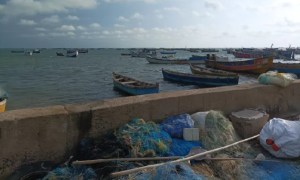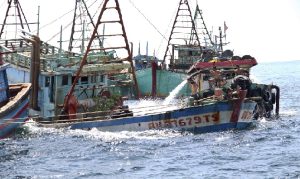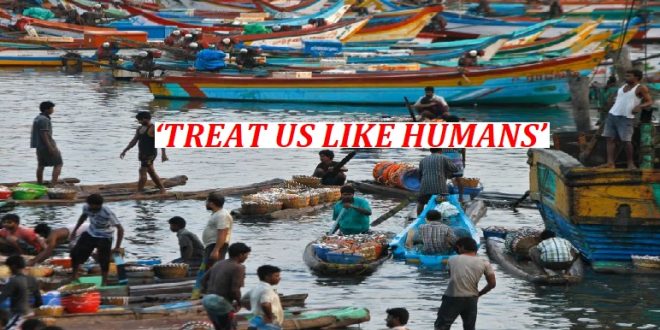03-01-2025
COLOMBO/ NEW DELHI: When Ashoka* heard boots approaching, he began to shiver in fear. The 23-year-old was in the engine room of his boat, as three Sri Lanka Navy (SLN) men boarded the vessel. When Ashoka, an Indian fisherman from Pamban Island at the southernmost tip of India, came out on the deck, he saw the officers beating and pushing the eight fishermen on his boat, using guns, iron rods and wooden logs.
 The ordeal continued for an hour, with one of the uniformed men yelling, “Beat them hard, harder”, recalls Ashoka, who was beaten too.
The ordeal continued for an hour, with one of the uniformed men yelling, “Beat them hard, harder”, recalls Ashoka, who was beaten too.
The fishermen all Indians were later handcuffed and chained, the steel edges cutting into their skin and causing itching. Chained together, none of them could move; otherwise, they would all fall. The fishermen were taken to a navy camp in Karainagar, north of Sri Lanka. Fifteen days later, two men whom the fishermen would later learn were from the Indian embassy in Colombo visited and gave them towels and soap. The men were finally released a month after they were arrested.
That was 2019, and the fishermen had been arrested off Katchatheevu, an uninhabited island that comes under Sri Lanka’s territory, for fishing in that country’s waters. Yet horrors of Ashoka’s experience have only become more and more commonplace since then peaking in 2024, with a spike in the number of Indian fishermen arrested by Sri Lanka, amid mounting tensions over allegations that military authorities mistreat them in custody.
A record 535 Indian fishermen were arrested by Sri Lanka in 2024 nearly double the previous year according to Indian government data. As of November 29, 141 Indian fishermen remained in Sri Lankan jails, with 198 trawlers confiscated.
In September, five fishermen who had crossed into Sri Lankan waters returned to Pamban with tonsured heads after they were arrested, and according to the fishermen were treated like convicts. They had to pay fines of 50,000 Sri Lankan rupees ($170) each to secure their release.
 Protests erupted within the fishing community in the southern Indian state of Tamil Nadu, where Pamban falls, against their government over frustrations that New Delhi has not been able to ensure their security. Meanwhile, in Sri Lanka, three other Indian fishermen were sentenced to six months of imprisonment along with fines.
Protests erupted within the fishing community in the southern Indian state of Tamil Nadu, where Pamban falls, against their government over frustrations that New Delhi has not been able to ensure their security. Meanwhile, in Sri Lanka, three other Indian fishermen were sentenced to six months of imprisonment along with fines.
The SLN and the country’s Ministry of Foreign Affairs have not responded to Al Jazeera’s emails requesting comments on the allegations that Sri Lankan officers mistreat arrested fishermen. “I wish they would treat us like humans,” says Ashoka.
‘That’s our fishing ground’
The Gulf of Mannar, an inlet of the Indian Ocean connecting India and Sri Lanka, is rich in biodiversity and a source of livelihood for both countries’ fishermen. Kachchatheevu, a tiny island in the Palk Strait, a stretch of ocean that divides the two countries, was historically a common fishing ground for Indians and Sri Lankans. The fishing rights of Indians in the region were scrapped in 1976 after the island was ceded to Sri Lanka by India in 1974. Today, Kachchatheevu is a site of frequent arrests of Indian fishermen.
For Indian fishermen in Pamban, crossing the maritime border into Sri Lankan waters is a matter of survival.
The catch on the Indian side has been declining amid climate change, increasing plastic pollution in the sea and the rampant use of mechanized trawlers over decades. Trawlers, which scrape the seabed in their search for fish, destroy the seafloor habitat, including coral reefs. This in turn disrupts breeding cycles. Marine experts also blame trawlers for sea pollution from abandoned nets and fuel spills. (Int’l Monitoring Desk)
 Pressmediaofindia
Pressmediaofindia




